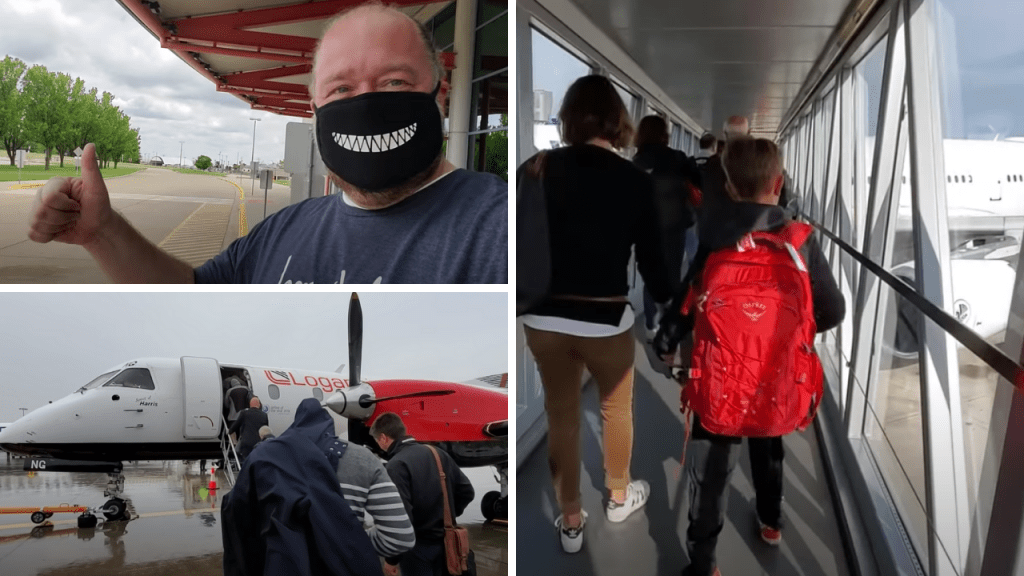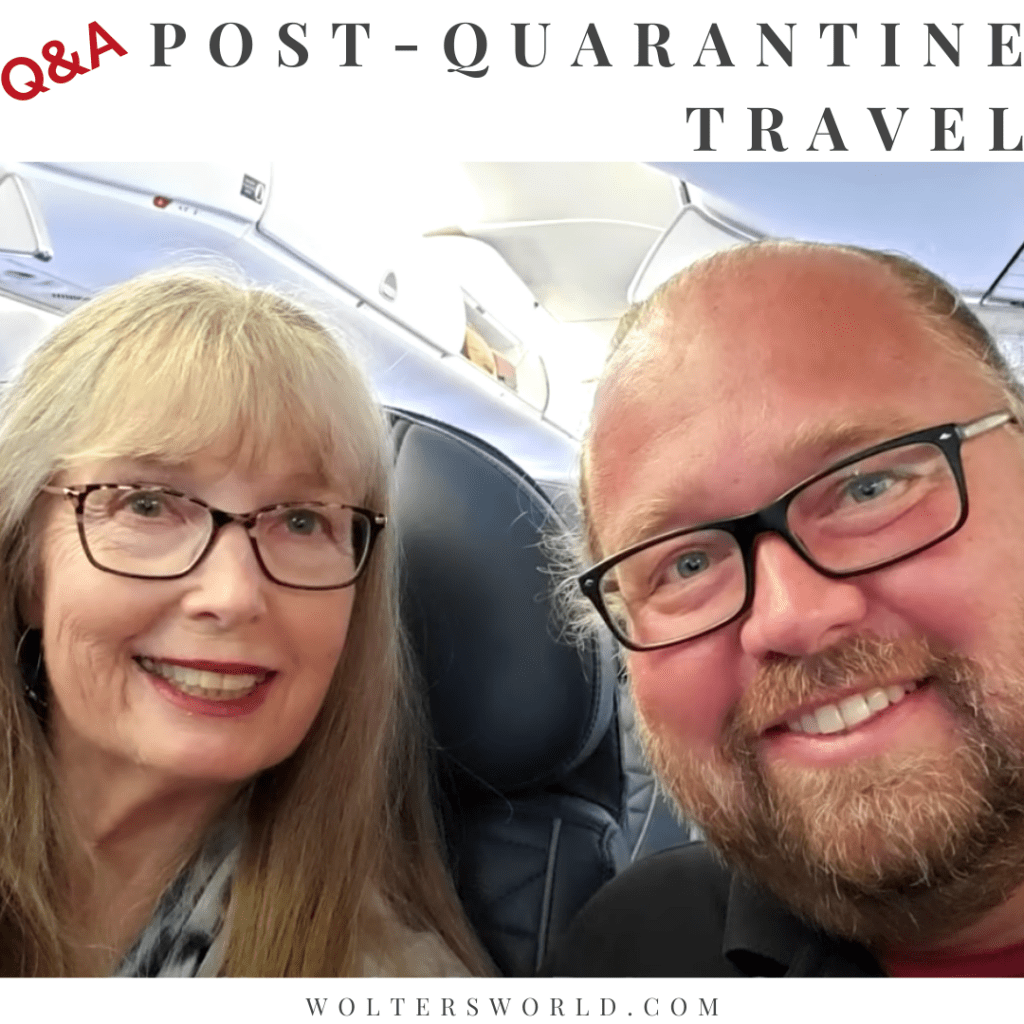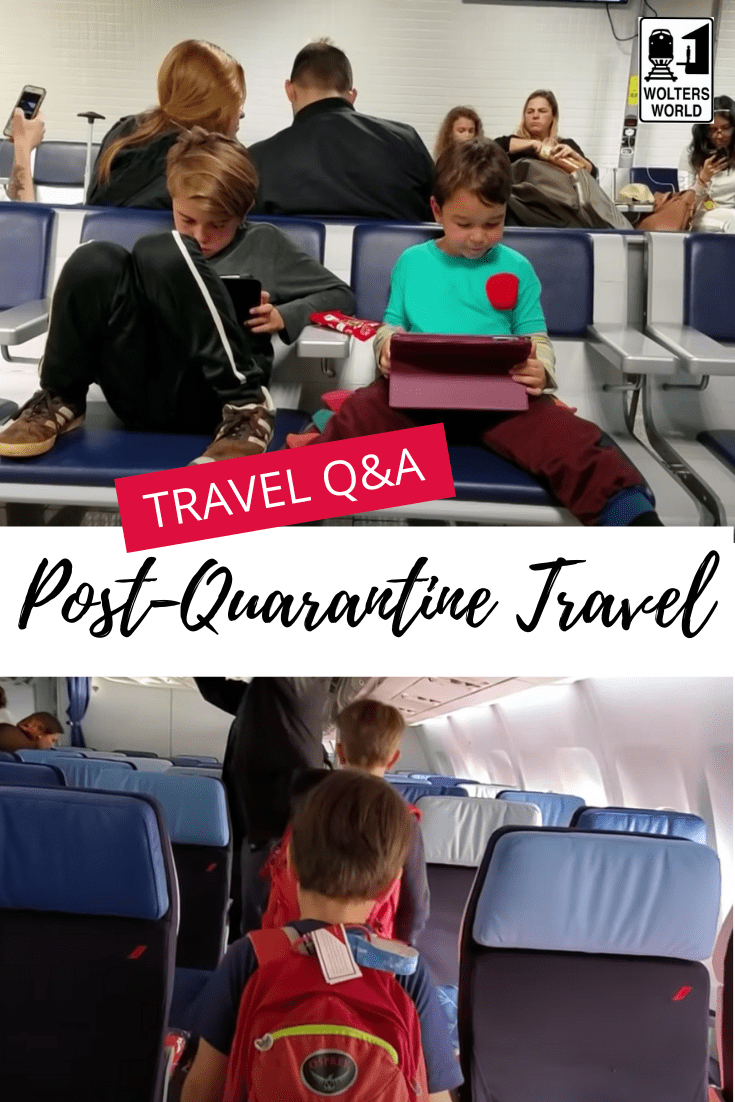Hey there, fellow travelers! Today, we’re talking about the impact of COVID-19 on the future of travel. With quarantines and travel restrictions, this global pandemic is estimated to have a greater effect on the travel industry than 9/11 or the 2008 recession. It’s going to change the way we travel for a long time to come. As travel experts, we thought we’d answer some of the most frequently asked questions about the future of travel in a post-pandemic world.
When Should I Get to the Airport?
Dads of the world are finally vindicated in their frantic quest to get to the airport early! I’m sorry to say it, but you’re going to need to get to the airport even earlier than before. Everything takes longer in a post-COVID world. Check-ins, security, even getting food from the food court, are all going to take longer.
Tips for Getting Through Airport Security Quickly
How Can I Speed Up The Departure Process?
I highly recommend downloading the app for the airline you are flying with. You will be able to check-in online and use a mobile boarding pass to go through security. Avoiding the check-in counter is probably the number one thing you can do to get to your gate more quickly. You can even track your checked luggage in the app.

How is TSA Adapting for COVID?
Firstly, TSA is reminding everyone to practice good hygiene. Wash your hands before and after you go through security as you’re touching a lot of different things that a thousand other people are also touching. They are also implementing social distancing while you wait in line, so pay attention to floor markers or signs telling you where to wait.
With reduced demand for travel, TSA may reduce staffing at some airports. This means there may be fewer checkpoints open. They will also be implementing enhanced cleaning procedures, so there may be a delay as they disinfect bins and belts in the security area. This is another great reason to arrive early at the airport as the security process will undoubtedly be slower.
As far as what’s allowed through security, the 3-ounce, 1-liter rule still remains for liquids. However, they have added one exception to the rule. As of March 13, 2020, TSA is allowing each passenger to carry a bottle of hand sanitizer that is up to 12 ounces in size. It must be screened separately from other liquids in your carry-on.
One additional exception that TSA is allowing for is expired driver’s licenses. With many DMV facilities closed due to COVID, the TSA recognizes that it may not be possible to renew your driver’s license at this time. If your license expired on March 1, 2020, or later, you will be allowed to continue to use it for up to one year after the expiration. Likewise, the Department of Homeland Security has pushed back the REAL ID deadline to October 2021.
Documents Required for International Travel
Will I Have to Wear a Mask?
Face masks are a hot topic right now. Some people claim the requirement is infringing on their personal rights, while others claim they vastly reduce the spread of germs. Regardless of your personal stance on masks, the airlines will most likely require you to wear them. Many airports are already requiring masks for passengers in the terminals. While many businesses will provide a disposable mask if you don’t have one, it’s better to find masks for your family that you can wear comfortably for several hours during your flight.

What About Temperature Checks?
Temperature checks are a quick way to test for possible symptoms of illness. They’re not new; we had to do temperature checks in Kenya and Tanzania last year, long before COVID struck. They are quick and easy, and there’s no physical contact involved. In fact, they can probably be incorporated right into the existing body scanners and you wouldn’t even know the difference.
Can I Still Use the Airport Lounge?
Who doesn’t love the free food, drinks, and WiFi in the airline lounges? Sadly, food buffets were one of the first victims of COVID, as most hotels have already done away with the breakfast buffet. The airport lounges will still be there but expect a lot of changes. They will likely assign your seat and ask you not to move seats so they can monitor the cleaning of each space. Food buffets will most likely be replaced with packaged snacks.
Will My Airplane Be Clean?
If you’ve flown with any airline in the last few years, you’ve surely received email updates from them, detailing their new cleaning procedures. American Airlines unveiled a 30-point cleaning checklist for each aircraft before departure. You’re going to see more cleaning done at the airport and on the planes. This is a GOOD thing! Armrests, seatbelt buckles, and tray tables will all get a fresh focus on sanitation before you take your seat.
What About the Recycled Air?
The cabin air is heavily filtered on airplanes, so it’s probably cleaner than the air in some peoples’ homes. It’s really not a bigger concern than breathing air anywhere else you are going to travel to.
What Should I Bring to Stay Safe?
Of course, even in the face of enhanced cleaning procedures, passengers may want to take matters into their own hands. It’s never a bad idea to travel with your own hand sanitizer and/or wipes. Since we travel with kids, we always have these things, but you can buy a travel packet of Clorox wipes in the travel section at Target or your local drug store. Feel free to wipe down your seatback screen and tray table, even the window if you’ll be pressing your nose up for a good view.

How Will Boarding Change?
The way we board a plane will most certainly change post-COVID. In recent years, airlines have changed up the boarding process to allow passengers the chance to upgrade their boarding group for a fee. We may see airlines return to a “back to front” boarding model that alleviates some of the aisle congestion during the boarding process. This eliminates crowding around the gate, as well as reducing how many people you pass by as you board the plane. You’ll also see social distancing markers at the counter and at the gate.
How Will Airplane Seating Change?
In the short term, many airlines are reducing capacity to increase space between passengers. Generally, this means the middle seat will be left open. This is great news for anyone who has endured a long flight sandwiched into that middle seat. However, reduced capacity also means increased scarcity for flights and you may not get those great deals you were hoping for as the airline now only has to sell ⅔ of their seats.
How Will My Packing Be Impacted?
I predict a temporary elimination of carry-on bags. As a family that prefers to travel carry-on only, this will be one of the biggest impacts we see when traveling. With changes in the boarding process, there’s no longer the incentive to upgrade to an earlier boarding group to ensure you get a space in the overhead bin. Stowing carryon luggage is one of the biggest delays during the boarding process, and is usually the reason people are bunched up together in the aisle. Strictly speaking from a boarding efficiency perspective, it makes sense to only use the space under the seat in front of you. However, this will equate to longer wait times at the baggage claim after your flight. This will surely change how you pack and what you pack in your luggage!
What Happens to Flight Prices?
At first, we will see flight prices decrease, as an incentive to encourage people to travel again. But eventually, with fewer seats to sell on each flight, I predict prices will increase to account for the reduction in availability. This also means it will be even harder to get those free upgrades, as there are fewer seats to upgrade to.
What Amenities Can I Expect?
As travel increases, airlines are going to be streamlining everything they can. This includes the in-flight service, magazines, blankets, and pillows. Everything that can be done to reduce contamination and spread of germs will be done. We’re not saying they won’t offer drinks at all, but the big menu of choices may be reduced to a single bottle of water, especially for long flights. Be prepared with your own snacks and water, as well as layers of clothing to ensure you are comfortable. I would also suggest having your own headphones; don’t count on the free ones they usually pass out.
Will Airlines Survive?
The reality is, not all airlines will survive this pandemic. Airlines are seeing up to a 95% reduction in revenue. Other airlines will survive but may have to drastically reduce their service and routes. If you live in a smaller market with a regional airport, you will likely see far fewer flights servicing your area. You may have to pay more for a flight or commute to a larger city nearby. The truth is, nobody knows how long it will take the airlines to recover from this. Some experts say it could take several years.
When Can We Travel Again?
The short, annoying answer that nobody wants to hear is: that depends. There are so many factors that will determine when we can travel again. Destination and country of origin are the two biggest factors. It’s already becoming easier to travel within Europe, or within the United States. However, it remains to be seen when Americans will start traveling to Europe again and vice versa. The European Union has announced there will be a summer travel season within the European Union. They have not announced when the borders will open to non-EU residents.
The rules and regulations are constantly evolving, so it’s really important to do your research. Not only for your destination but also for the travel companies you choose as you’ll want to ensure you are covered by trip insurance and lenient cancellation policies. Some countries will test you upon arrival, while others will impose a quarantine of up to 14 days.
Beyond the individual country rules and regulations, deciding when to travel again is a very personal decision. Some travelers aren’t comfortable traveling until there is a COVID vaccine. Other travelers are ready to hit the road tomorrow!
Should We Cancel our Fall Trip?
Many travelers have scrapped any summer travel plans, or have scaled back to destinations within driving distance. A lot of travelers are now looking to autumn and wondering if those trips should be canceled too. Our advice is to wait and see. In terms of this pandemic, 3 months is a lifetime away and a lot can change. If you cancel now, you’re going to lose money or end up with airline credits. If you wait and the airline cancels your flights, you’re entitled to a full refund.
Grab Some Wolters World Travel Gear!
Of course, nobody has a crystal ball to see what exactly travel will look like in six months or one year from now. The changes we predict will vary greatly by the individual airline, as well as by country or region. But, the airlines and the travel industry need our help to rebound. As soon as we feel it’s safe to travel again, we’ll be out flying the friendly skies, and we hope you will, too!
Looking for more travel advice? Check out these other blog posts:
